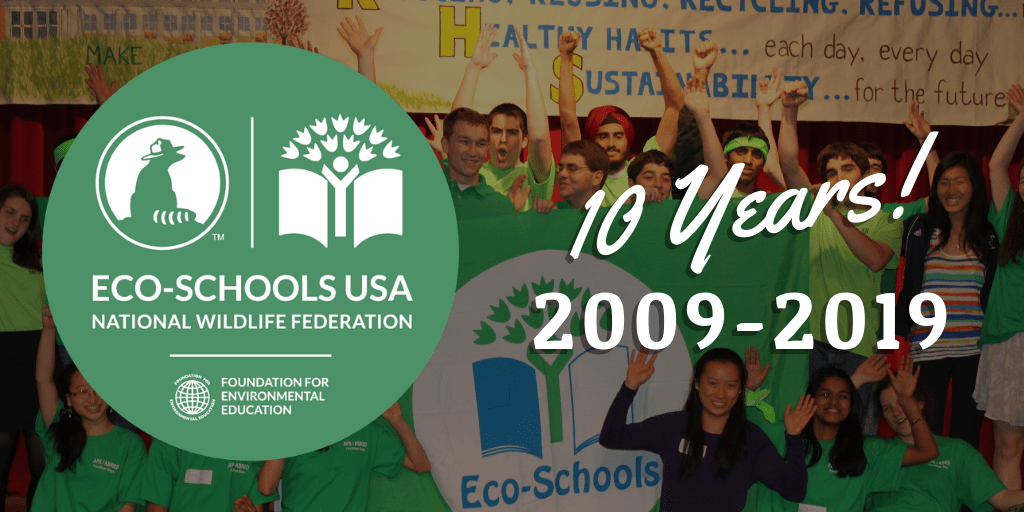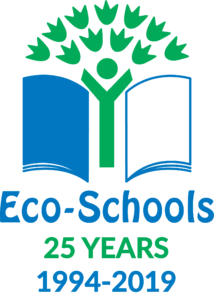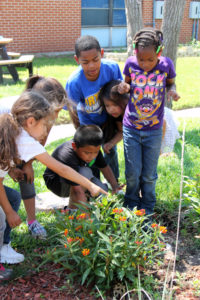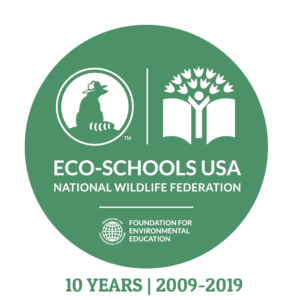We have much more to do and your continued support is needed now more than ever.
NWF Eco-Schools USA is Turning 10!

It’s a new year, and what better way to start than with an anniversary celebration! It’s been ten years since the National Wildlife Federation became host and operator of the Eco-Schools USA program. Starting with just one school in 2009, the program now reaches more than 5,300 U.S. schools and over three million students nationwide. And, our amazing 10-year celebration coincides with the recognition of the global Eco-Schools network of 51,000 schools, serving 19 million students and 1.3 million educators in 68 countries now celebrating 25 years of life-changing sustainability education and action.

Over the past decade, NWF Eco-Schools USA has become the largest comprehensive green school program in the U.S. It now operates in most major U.S. urban school districts and is growing in popularity and impact among students, educators, school administrators and parents. The reasons for this are simple.
Right away, participating schools are saving money on their utility bills through energy and water conservation programs ─ and those funds can go right back to the classroom. By teaching students the value of such things as saving energy and water, avoiding food waste, and recycling, the average Eco-School can save many thousands of dollars on expenses each year.

A second plus is that Eco-Schools are ideal platforms for learning science, related technology skills, and community problem solving. This helps students to prepare for a future where knowledge of sustainability will offer significant advantages in job and career development. And, Eco-Schools’ focus on environmental improvement helps students develop a deeper sense of respect and responsibility and more willingness to help save the planet.
An Eco-School is alive with action and color. Step inside, and you will see students conducting energy audits or organizing and counting their recycling success. Students and faculty work in teams to reduce water usage, cut down on wasted cafeteria food and increasing composting. Inside the school, environment-based student art will be on the walls and outside the grounds will have native gardens, habitats and outdoor classrooms. Students plant food gardens, foster native plants, and support pollinators such as the monarch butterfly. Eco-schools are filled with a palpable enthusiasm for learning.

NWF Eco-Schools USA ties learners to the future by connecting the three main elements of sustainability: social equity, environmental improvement, and economic prosperity. Each participating school develops an overall plan and a code of conduct, and adopts educational themes that support learning in critical subject areas of interest to the students. Faculty and students go on a journey together to learn about energy, water, oceans and wetlands, recycling, climate change, sustainable food and more. Most importantly, they learn to see how their actions affect a larger world and they develop personal relationship with solutions that will lead to a more balanced planet.
Eco-Schools: Empowering Today’s Students for a Sustainable Tomorrow
The program’s future prospects are bright. Our goal is to grow to 15,000 schools in the next ten years and serve some 10 million students per year. We also expect that the students in these schools will be fully representative of the rich racial, ethnic, and cultural diversity of America. We have learned much in our first ten years and are in a good position to grow, reach more students and faculty, and have Eco-Schools USA play a more central role in the development of a lasting base of knowledge and skill needed to take on the environmental challenges of the future.
 Join us as we move into the next ten years and beyond. Spread the word, share your success stories with us on social media, and encourage others to join the NWF Eco-Schools USA movement. The NWF Eco-Schools USA website provides helpful tools and resources for school communities, including a monthly e-newsletter, pathway specific audits, on-line training information, Green STEM and climate education resources, and more.
Join us as we move into the next ten years and beyond. Spread the word, share your success stories with us on social media, and encourage others to join the NWF Eco-Schools USA movement. The NWF Eco-Schools USA website provides helpful tools and resources for school communities, including a monthly e-newsletter, pathway specific audits, on-line training information, Green STEM and climate education resources, and more.
“We use the outdoor classroom to ‘do science,’ not just read about it. Our students are passionately learning, utilize all five senses to achieve education goals. These goals will take these students into the future.” – Don Hutzel, Principal, Churchill Road Elementary
Want to learn more about Eco-Schools USA? Visit our website to read about how your school can become an Eco-School!
Like what you read? Please consider making a donation to support our conservation programming like Eco-Schools USA:






















